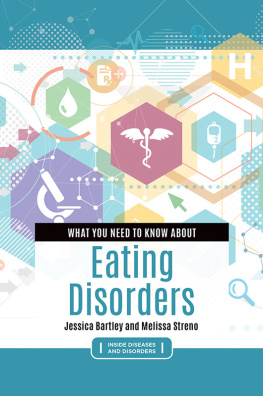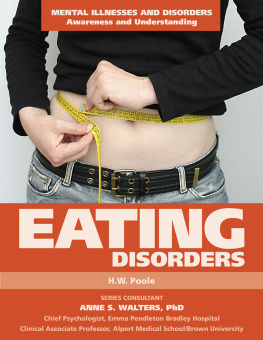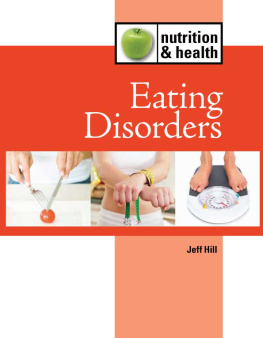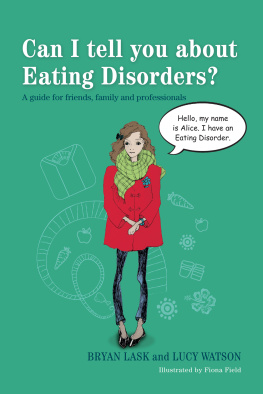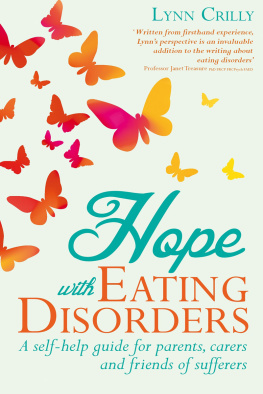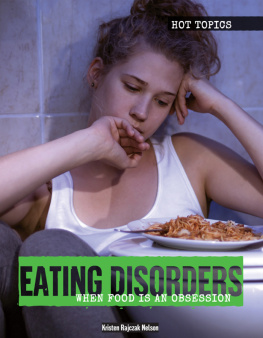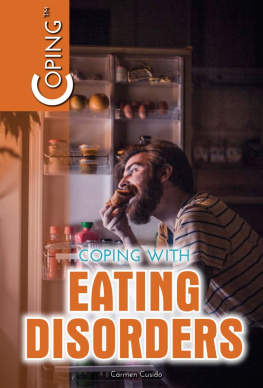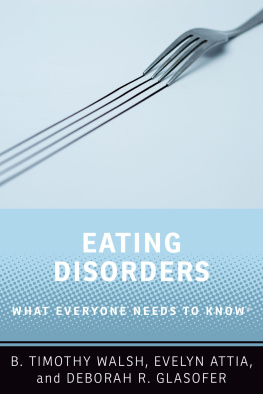Jessica Bartley - What You Need to Know about Eating Disorders
Here you can read online Jessica Bartley - What You Need to Know about Eating Disorders full text of the book (entire story) in english for free. Download pdf and epub, get meaning, cover and reviews about this ebook. year: 2020, publisher: ABC-CLIO, genre: Home and family. Description of the work, (preface) as well as reviews are available. Best literature library LitArk.com created for fans of good reading and offers a wide selection of genres:
Romance novel
Science fiction
Adventure
Detective
Science
History
Home and family
Prose
Art
Politics
Computer
Non-fiction
Religion
Business
Children
Humor
Choose a favorite category and find really read worthwhile books. Enjoy immersion in the world of imagination, feel the emotions of the characters or learn something new for yourself, make an fascinating discovery.
- Book:What You Need to Know about Eating Disorders
- Author:
- Publisher:ABC-CLIO
- Genre:
- Year:2020
- Rating:4 / 5
- Favourites:Add to favourites
- Your mark:
- 80
- 1
- 2
- 3
- 4
- 5
What You Need to Know about Eating Disorders: summary, description and annotation
We offer to read an annotation, description, summary or preface (depends on what the author of the book "What You Need to Know about Eating Disorders" wrote himself). If you haven't found the necessary information about the book — write in the comments, we will try to find it.
What You Need to Know about Eating Disorders — read online for free the complete book (whole text) full work
Below is the text of the book, divided by pages. System saving the place of the last page read, allows you to conveniently read the book "What You Need to Know about Eating Disorders" online for free, without having to search again every time where you left off. Put a bookmark, and you can go to the page where you finished reading at any time.
Font size:
Interval:
Bookmark:

About the Authors
Dr. Jessica Bartley is a clinical assistant professor in the sport and performance psychology program and the director of the Center for Performance Excellence at the University of Denver. She is also contracted as a sport psychologist with several Olympic athletes and teams through the United States Olympic Committee and is a member of a group private practice focused on sport and performance consulting. Dr. Bartley holds an MA in sport and performance psychology (2008) as well as a doctorate in clinical psychology (2012) with an emphasis in sport and performance psychology and behavioral therapy from the University of Denver.
Dr. Melissa Streno is a clinical psychologist at EDCare, an ED treatment facility in Denver, Colorado. She is also an adjunct professor in sport and performance psychology in the Graduate School of Professional Psychology at the University of Denver and is part of a group private practice focused on sport and performance consulting. Dr. Streno earned her PsyD in clinical psychology in 2015 from the University of Denvers Graduate School of Professional Psychology. She also earned an MA in sport and performance psychology (2010) from the University of Denver.
GABRIELLE
Gabrielle is a 16-year-old female currently struggling with anorexia nervosa, restrictive type. She is completing her sophomore year of high school at a new school due to recently transferring after her freshman year. During this first year of high school, she experienced significant difficulty making friends and was often bullied and teased for her appearance and clothing style. She takes honors classes for both science and math while also participating on the schools speech and debate team and annual theatre production. She has acknowledged a strong desire to fit in socially and to find a greater level of connection with her peers both in and out of school. As a result, she has recently started comparing herself to some of the other students she has viewed as popular since her first day at the new school. Gabrielle has always struggled with self-confidence, but specifically in terms of body image thoughts and critique of herself. She also fears others are frequently judging her, based on evidence of earlier bullying. Historically, she has never felt thin enough and has been berated by her mom, who also struggles with disordered eating patterns. When Gabrielle makes comments about her weight, they are often reaffirmed and followed up with proposed ideas to lose weight from her mom. Previously, she never engaged in any long-term restricting or other ED behaviors, but she has grown up in a household where clean eating and a narrow list of food choices are consistently encouraged. Gabrielle began researching ways to lose weight and has started to experiment with cutting calories and reducing portions. She is more frequently swapping some of her normal food choices, such as chips, with what she believes are healthier items, like fruit and salads. Her portions sizes have also decreased as she starts to eat half the servings she previously did. Gabrielle revels in the gradual weight loss as the compliments from friends and family start coming in daily. The attention fuels even more stricter eating to the point of eliminating full meals and avoiding events that would involve eating, such as holiday meals, birthday parties, and social engagement centered around eating out together at a restaurant. There is constant attention on her body from herself and others as well as a strong desire to continue losing more weight. She feels as though the only way she will make friends is if she is in a smaller body, thus placing significant importance and value around the number on the scale and size of her clothing. Like many who struggle with anorexia, Gabrielle continues to lower her weight marker each time she hits a goal, often encouraging herself with statements like, Only five more pounds. The control over the loud thoughts and the temporary relief that comes from achieving what she believes will help her attain connection has kept her in the illness much longer than anticipated. It has also brought her closer to a routine of loneliness and fixation on food. Ironically, the more she restricts her food and disallows involvement with events or experiences including food, the more isolated she becomes. This is the opposite of what she initially intended to happen by experimenting with ED behaviors, and now she is fully entrenched in her illness. She is starting to notice its effect other areas of life, including her studies and performance events. She has difficulty paying attention in class, retaining the material, and memorizing her lines for the upcoming play. Her family has also experienced her with less energy and fogginess in the brain during their more limited interactions. Gabrielle seems to be somewhat checked out and avoidant of much interaction with them or the few friends she has connected to at school. As her weight drops below what is appropriate for someone her age, developmental level, and height, she has also started to experience some of the hallmark physical signs of an eating disorder as she plummets further into it: exhaustion, changes in the strength of her nails and hair, dizziness, fatigue, and mild cold intolerance. Despite her family and friends now starting to notice more of these consequences, she remains defensive and minimizes her struggle when they express concern or offer support. The more people work to get closer, the more Gabrielle pushes them away in order to spend time cultivating her relationship with her eating disorder.
Analysis
Gabrielles narrative highlights a common precursor to developing anorexia nervosa as well as a usual trajectory of events leading to greater fusion with this illness. While each individual presentation varies in some regard, the progression of denial (Im fine!), firm belief her behaviors are normal, and eventual isolation away from friends and family are all frequently observed components of this illness. As described in Gabrielle meets criteria for anorexia nervosa, restrictive type due to her efforts to decrease her intake, resulting in significantly low body weight, expressed fear of weight gain, and a distorted and negative body image. Additionally, Gabrielles lack of awareness for the severity of her struggle is an indicator for not only having an eating disorder but also allowing it to take greater control of her daily functioning and overall health. Gabrielles body mass index (BMI) remains above 16, which would warrant a current severity level of moderate. This is another reason that immediate support toward interrupting her behaviors could propel a more hopeful prognosis instead of reaching an even more worrisome place physically and psychologically.
Individual therapy and participation in an adolescent support group may offer Gabrielle the space to connect with others enduring similar struggles as well as open up about past and current events influencing her use of ED behaviors. This may illuminate the need to further evaluate her social influences and potential need for boundaries. As far as the function of her ED behaviors, there are many possibilities. Gabrielle could be using her restriction to feel more in control when all other realms of her lifespecifically, fitting in with her peersfeel so distant. Another drive for remaining connected to her disorder could be resistance to the feelings accompanying these distressing experiences. For example, she could be using restriction to mask and distance herself from embarrassment, sadness, loneliness, and so forth.
It would be important for Gabrielles parents and primary care doctor to determine whether outpatient level of care is sufficient at this time or if another option, as mentioned in , is more appropriate. Finally, it would be beneficial for her family to participate in and utilize some of the many available resources described throughout the book that are intended to inform and support those navigating the caretaking role on behalf of someone working to recover.
Font size:
Interval:
Bookmark:
Similar books «What You Need to Know about Eating Disorders»
Look at similar books to What You Need to Know about Eating Disorders. We have selected literature similar in name and meaning in the hope of providing readers with more options to find new, interesting, not yet read works.
Discussion, reviews of the book What You Need to Know about Eating Disorders and just readers' own opinions. Leave your comments, write what you think about the work, its meaning or the main characters. Specify what exactly you liked and what you didn't like, and why you think so.

